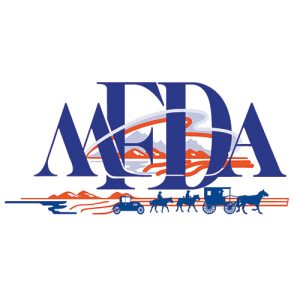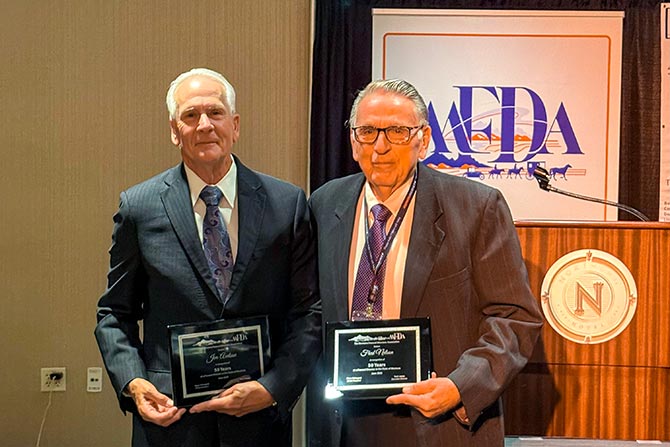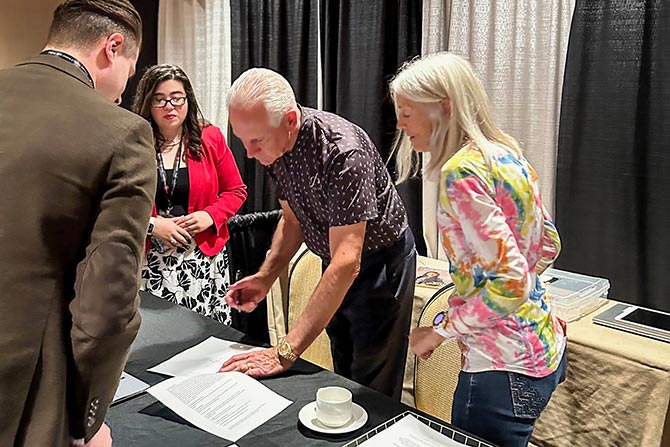Feature image: James Axelson (left) and Fred Nelson (right) with their 50-year award plaques
James Axelson
James Axelson has dedicated over 50 years to the funeral service industry, and MFDA is proud to recognize such professional excellence. We had the chance to sit down with James to learn more about his career and his experience in the industry. The following are excerpts from our conversation.
Tell us about yourself.
I was born and raised in Butte, Montana. I’ve never been outside of Butte except for mortuary college, and that was back in the time of the dinosaurs. I’m happily married to my wife of 46 years. I have two incredible sons, their incredible wives and four grandchildren, who are the light of my life.
I am a third-generation funeral director, which is not uncommon in my industry. Both of my grandparents and parents were funeral directors, as was my brother Steve Axelson, who passed away in 2023. Of note, my mom was the first woman on the MFDA board back in 1972. Montana used to be a dual licensing state, and her license, when she passed away in 2012, was the last remaining funeral director’s license.
I have been incredibly honored to have been appointed by two different governors in the state of Montana to three different terms on the Board of Funeral Service. I currently serve as the chair, and I will complete my third term on the board in 2027.
What do you consider to be the most significant change you’ve witnessed in the profession over the past 50 years?
Probably the largest change is the wider acceptance of cremation, which has existed for a long time, but more recently, has become more common in our society. In my grandparents’ and parents’ generations, cremation was something that rarely occurred. As I came into the profession, that was starting to evolve. Looking at cremation rates today, Earth burials seem to be more of an exception rather than the norm.
What is your greatest career accomplishment?
One of my mentors told me that, in addition to being a really great funeral director, it was also my job to replace myself and carefully bring on others so that the profession continues to keep the high standards and dignity that it’s known for.
I’ve been absolutely honored to mentor some incredible young men and women in this profession. That is the most gratifying and most rewarding thing. It has been an honor to pass on the wisdom and instruction from my mentors.
How has MFDA helped you throughout your career?
Being surrounded by peers in my profession has paid me rewards that are innumerable. When I’ve been in a situation that I’ve not faced before or some problem that needs another set of eyes, being able to call another MFDA member has definitely made me a better funeral director. Without those men and women that I’ve relied on heavily through the years, I think I really would have been lost in the profession on a lot of different occasions.
I was so thrilled that Terri was the one who was named our executive director after Jim Brown’s retirement. Jim did an incredible job, and when he came on board, the association was floundering a little bit. Jim was able to right that ship and start to get us going on a completely different trajectory that has been wonderful for the association. I’m sure Terri will continue that because she brings an exuberance and a fire that I know the association is truly going to enjoy.
What is the best advice you have received?
The best advice I ever received was to always remember the incredible trust that has been placed in me by families. They were trusting me with the most important thing in their life, and there was nothing more important to them than the person being taken care of.
My mom told me that you are going to suffer the emotions and cry those tears, but to cry them in private. The family does not need you to hold their hand and cry with them. The families are looking for the one person who can bring some semblance of rationality to the irrational situation. Don’t allow your emotions to overwhelm you to the point that you can’t serve that family.
My mentors once told me that it’s OK to not have all the answers and not to say anything. People, especially during visitations, will say, “God only takes the best” or “Your little girl is now in God’s garden.” Those things may sound lofty and poetic, but they do nothing to serve the family. I tell families just to be patient with people when they say those kinds of things. It’s the best they can do. But sometimes, there are no words.
Any last thoughts?
When they told me that I was getting an award for 50 years in funeral service, I thought, “Wow, that went by fast,” because I truly went from getting out of mortuary college, blinking, and suddenly it’s 50 years later. The award is quite an honor, and it’s very nice of them to remember me this way.
Fred Nelson
Fred Nelson has dedicated over 50 years to the funeral service industry, and MFDA is proud to recognize such professional excellence. Currently, he is a funeral director at The Lake Funeral Home & Crematory in Polson, Montana. We had the chance to sit down with Fred to learn more about how he got started in the industry and what he has learned over the course of his career. The following are excerpts from our conversation.
Tell us about yourself.
I was born and raised in a small town in southern Idaho. There, I got to know a funeral director who became a family friend and got me interested in the general industry. But when I was in high school, there was a tragedy involving three of my friends. We were all supposed to go to a movie one night, but my folks said, “No, you’re not going.” In the moment, I was not happy about that. Tragically, my other three friends lost their lives in a car accident that night, and I was devastated.
From then on, I decided to go into the funeral service industry. I started my apprenticeship in Boise, Idaho, the day after I graduated from high school. That was in 1962. I got my license in Idaho in 1966 and moved to Montana in 1975, and I’ve been serving the people of Montana for 50 years.
What do you consider the most significant changes you’ve witnessed in the profession over the past 50 years?
Back when I started, traditional funerals and burials were the way people paid their respects to the deceased. Things have really changed lately. I’ve noticed that people are moving away from what I call “traditional funeral services,” and they’re doing what they call a “celebration of life.” It’s just a different way of honoring each person.
One thing I’ve noticed is that some ministers and priests do services the way they want to have them conducted, not the way families want them conducted. It’s been hard for me to adjust to that, but you have to go with the flow. It’s not all ministers or priests, but it drives people away from the funerals. Listening to families and honoring their traditions is the way we serve and support families in these difficult times.
I’ve also noticed that people don’t attend funerals like they used to. It seems that people are busier, and the atmosphere is changing. To me, the service doesn’t do the deceased any good, but it’s for the family and people to say their last goodbyes.
What is your greatest career accomplishment?
At my age, I enjoy still being active enough to serve people and serve them the way they need to be served. One example that happened later in my career was when the funeral home I was working at had a funeral director suddenly pass away. We had funerals scheduled that same week as his, and the families wanted to cancel those services. However, myself and one other felt ready to come back and provide the funeral services for those families instead of canceling them, so we did.
How has MFDA helped you throughout your career?
MFDA makes sure to give us enough opportunities for CE so that we can keep up our certifications. They also help us network very well with the other funeral directors. If you have a question or a problem, they come back with an answer and are always willing to help.
I’ve seen other states not do so well and have the mindset that it’s your problem to get your CE taken care of. We don’t want to end up like some of the states where they’re doing away with licenses for funeral directors and morticians. We need to keep those licenses. We run respectable businesses, and I don’t want to be classified as someone who disposes of dead bodies. I want to keep this an honorable profession.
What is the best advice you have ever received, and how has it applied in your daily life?
Years ago, a funeral director told me to treat people the same way I wanted to be treated, whether it’s in the profession or in everyday life. If you don’t treat people the way you want to be treated, it’s downhill from there. You have to respect everybody if you want to be respected, whether you agree with what they do or not.
Any last thoughts?
We need to get more people into the profession — people who really want to serve others, not just have a job. This profession is not a regular 8-5, Monday through Friday. It’s 24/7/365. It’s nights, weekends and holidays. You give up a lot of your time, and it’s not an easy profession. But it’s a profession that I’m very proud to be a part of.







